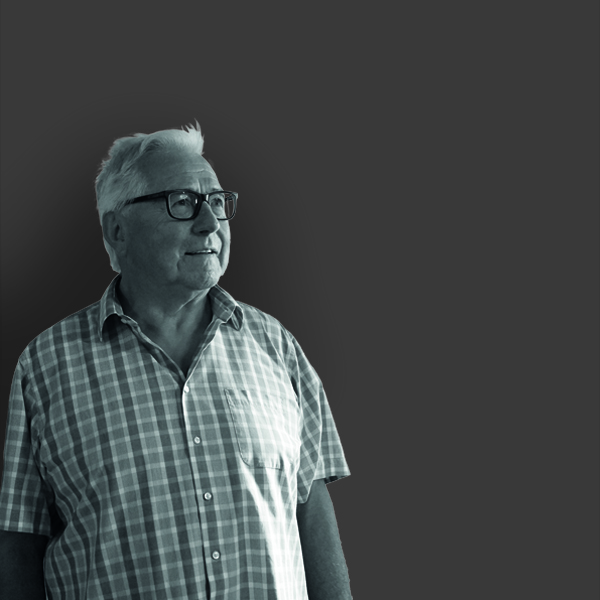Contemporary witness Franz-Jürgen Lehmkuhl
Sunny and shady sides in the GDR protective strip

born on 16.09.1951 in Konau
Childhood in the protective strip of the border
German audio file – Please scroll down for the English text version
The border fortification
Escape thoughts
The turning point
Childhood in the protective strip of the border
We had an excellent childhood. My sister and I, we grew up with my parents on the farm. My parents had run a very functional farm.
Chronologically, we got a car in 1957, I had a motorbike at 16 and a riding horse at 14, and my parents always made sure we were well off, that was the sunny side of our lives.
The shadow was the other, of course we have experienced that a child’s leg, for example, we once came home sometime after the official curfew of my father’s friends and were stopped right in front of our yard and then were not allowed to enter our property and then my father got very angry and then told the organ: “And the children come to bed, they don’t stay here sitting in the car!”
My parents then had to stand in front of the courtyard from 11 a.m. until 5 a.m. waiting to be allowed into the house, but in between, my mother was allowed to put us to bed.
And that is actually how it has always developed. The border was not as it was generally imagined. The border grew very, very slowly.
When we went to school, we weren’t allowed to say that my parents didn’t watch “aktuelle Kamera”, but the “Tagesschau”.When we went to confirmation classes, we weren’t necessarily allowed to talk about it.I was baptised, I was confirmed and I am still in church today.
It was a constant conversation, we always had to make sure that nothing was said about West German television.
There were people everywhere, for whom I even have understanding today, who walked around in front of the windows and obeyed. Those were the ones who fell for the things of socialism.
The border fortification
But the next fence was built along the dunes, with three big rolls of wire, and yes, that wasn’t so scary for us.
It was still easy to crawl through, and that’s what we did as children.
And the gates – I had to herd cows with my sisters and we brought in hay there and I bathed in the Elbe there, although it was forbidden “who knows how”.
My mother wasn’t always so afraid. For example, as children we were put on the hay cart because my grandparents from the west, on the west side of the Elbe, were standing so that they could see us. We were held up on the hay cart.
Als wir dann junge Leute waren und wir hatten im Hochsommer Hochwasser in der Elbe, da hat mein Vater gesagt, „du Jung…“– ich fuhr dann schon mit dem Moped – „…du kannst dann mal um die Hochwasserzonen rum hinter dem Stacheldraht und musst du noch mal das Heu umkehren“, weil die das Nachmittags einfahren wollten.
Und dann hat doch ein Soldat auf mich Warnschüsse abgegeben, wie ich durchs Wasser gegangen bin. Das hat mich schon geprägt!
Wenn das neben Ihnen mit dem Maschinengewehr plätschert, ich war sehr brav dann.
Thoughts of escape
A stark memory from my life in 1960, when the first LPG was introduced,
my parents had been given a new Wartburg 311 of its time and were allowed to use it to visit my grandparents in Uelzen and had already packed everything that was considered valuables at the time.
My parents then swam at night through the Elbe from the West to the East and wanted to catch up with us children because they did not want to submit to the regime.
And I can still remember well as a boy – I was nine years old – that my grandfather used to shout in the house.
And so that was a very dramatic night and my parents then swam back to the west without having achieved anything and then officially came here again.
The turning point
At that time, the border and travel situation was a bit more relaxed and we always said we’ll see how it goes: We’ll do it. We plan it and that’s it!
And then in the summer, I visited my parents in the border area on my motorbike, as I often do, and I was in the parlour and then Schalck-Golodkowski said those special words on the news that the borders were open and travel was free.
Of course I couldn’t do anything with it, I couldn’t imagine it either.
We then drove to the West as usual with the Trabant for my birthday and had some great experiences: Shortly after Hamburg, someone with an Audi parked behind us at a rest stop – I’ll never forget it – and gave me 100 DM saying “Do you want to drive back?”. I say “Of course, I have my children at home and I have my life at home”.
I hadn’t yet understood what was coming.He gave me the 100 marks and got into the car and drove on.
Then we went to acquaintances we had met about balloon friendships, which existed in GDR times because we mainly had a west wind, and in the West, in order to get in touch with the East, they let balloons fly with the address.